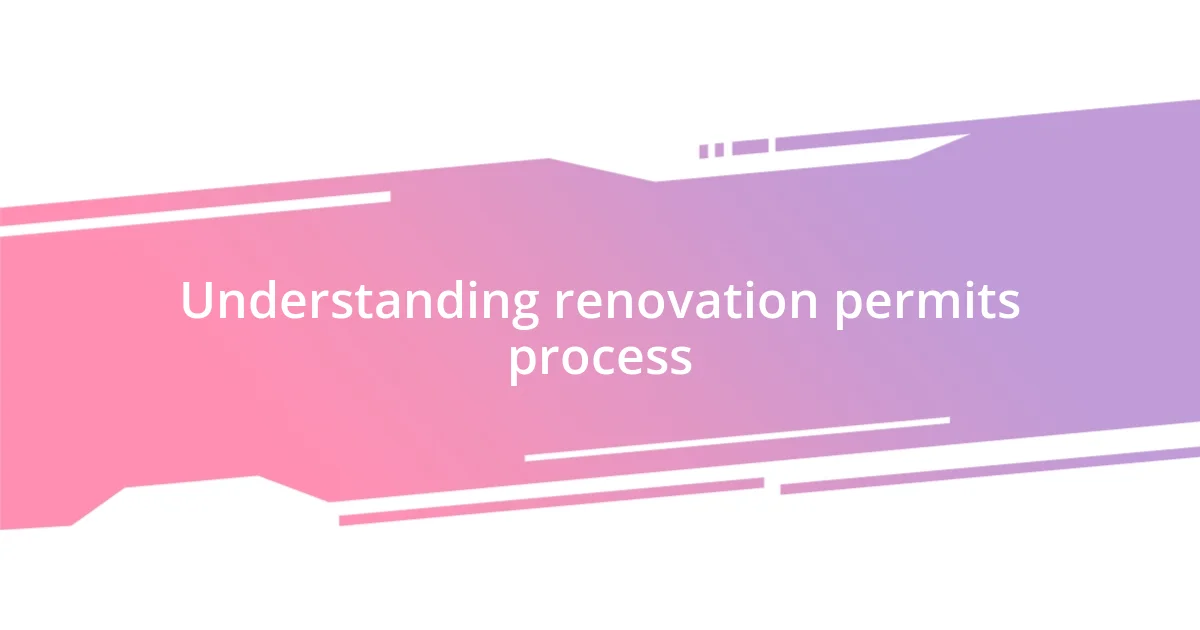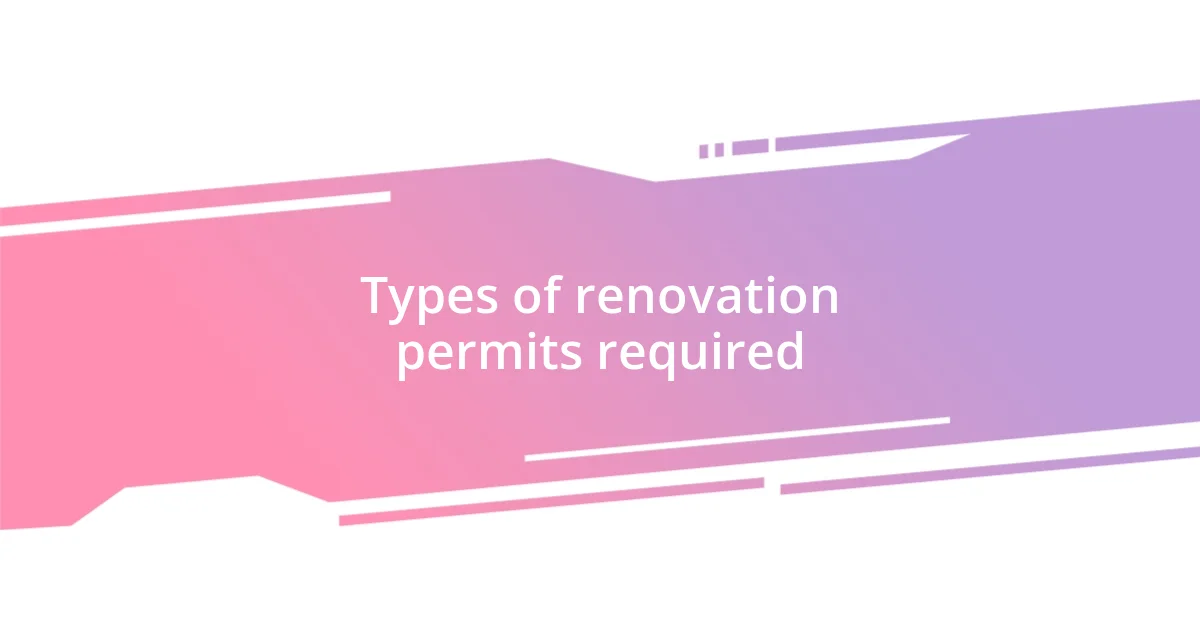Key takeaways:
- Researching and obtaining the correct renovation permits is essential to ensure safety, legality, and compliance with local regulations.
- Different types of permits, such as building, electrical, and plumbing permits, are required based on the nature of the renovation project.
- Common challenges in the permit process include bureaucratic delays, communication issues, and the need for patience throughout the application waiting period.

Understanding renovation permits process
Navigating the renovation permit process can feel overwhelming, but it’s essential for a successful project. I remember my first renovation; I thought I could skip the permit step, but as I learned, obtaining permits is crucial to ensuring my work met local codes and standards. Have you ever faced a hiccup in your project because you didn’t check the requirements? It happened to me!
The first step involves researching what permits you need, which often varies by location and type of renovation. I discovered that I needed different permits for structural changes compared to cosmetic updates. The intricate dance of ensuring everything adheres to regulations can be frustrating, but I found that asking my local building department simple questions was incredibly helpful. It’s okay to feel a bit lost at first; we’ve all been there.
Once you submit your application, the waiting begins, and this can be nerve-wracking. My heart raced with anticipation as I waited for approval on my last project. Reflecting on that experience, I realized how having patience during this phase was key to my renovation’s success. Isn’t it interesting how a little paperwork can pave the way for such big transformations in our homes?

Importance of permits in renovations
It’s easy to underestimate the significance of permits in renovations, but I’ve learned the hard way that they’re vital for both safety and legality. When I started my bathroom remodel, I thought a few minor changes wouldn’t require a permit, only to discover later that the electrical work I’d done was illegal. This sobering realization reminded me how critical it is to follow proper procedures. The last thing you want is to face fines or worse, jeopardize your home’s safety.
Here’s a quick rundown of why permits matter in renovations:
- Safety Assurance: Permits ensure that renovations adhere to safety standards, protecting both your family and property.
- Legal Compliance: They keep your project within the law, saving you from potential legal troubles.
- Resale Value: Should you decide to sell your home, having permits can make your property more attractive to buyers.
- Insurance Protection: In the event of damage or accidents, having the proper permits can safeguard your insurance claims.
I vividly recall the reliving of my stress when a neighbor mentioned my lack of permits could lead to trouble. It’s those types of experiences that solidify why every detail counts in the renovation process.

Types of renovation permits required
Understanding the types of renovation permits required is crucial for anyone planning a home project. I remember distinctly the excitement I felt while planning my kitchen overhaul, only to realize that I needed a building permit due to structural changes I intended to make. Honestly, the variety of permits can be a bit overwhelming at first. Some major categories I encountered include building permits, electrical permits, and plumbing permits. Each serves a unique purpose aimed at ensuring safety and legality.
As I dove deeper, I found that not all projects necessitate the same permits. For instance, while minor cosmetic upgrades often fall under simple permits, significant changes—such as removing load-bearing walls—require more extensive documentation and evaluation. In my case, I had to get both a building permit and an electrical permit because I added new lighting. Understanding this difference saved me from facing potential roadblocks and delays later in my renovation journey.
To help clarify, I compiled a quick comparison of the most common types of renovation permits you might encounter:
| Permit Type | Description |
|---|---|
| Building Permit | Required for structural changes, including additions or major interior modifications. |
| Electrical Permit | Necessary for any electrical work, including new wiring or upgrades. |
| Plumbing Permit | Needed for new plumbing installations, alterations, or extensive repairs. |
| Demolition Permit | Essential for removing any structures, including parts of your home or an entire building. |

Common challenges in obtaining permits
Navigating the permit process can be quite a headache. I still remember stumbling through bureaucratic red tape during my last renovation. Each time I thought I was getting close, a new requirement cropped up—like suddenly needing additional documentation for something I believed was straightforward. Have you ever felt that rush of frustration when you realize the goalposts keep moving? It’s exhausting, but it’s par for the course when dealing with permits.
Timing is another common challenge. I was knee-deep in planning my deck when I realized that processing times for permits can generally vary from weeks to even months. The delays caught me off-guard, as I’d hoped to start construction in the spring. I found myself questioning my project timeline and wondering how I could have better prepared for this. It’s a stark reminder that patience is crucial, and anticipating these delays can save you from disappointment.
Communication issues can also throw a wrench into the works. I once had a back-and-forth with my local planning office that felt like I was in a game of telephone. Misunderstandings about my proposed changes led to requests for revisions that seemed ambiguous at best. Have you ever had an experience where clear communication suddenly became a challenge? It highlighted the importance of being thorough and asking questions, even if it feels tedious at the moment. Each interaction taught me that being proactive about communication could ease the process significantly.














